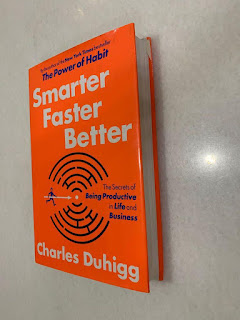Smarter Faster Better book summary
Chapter 1: Motivation
Our internal locus of control gives us motivation (feels good) to be in control (Example of marine training where the cadets are in control of their environment). “Unless we practice self determination and give our self emotional reward for subversive assertions, our capacity for self motivation can fade.”
Choices and actions we make need to connect to a purpose, why we are doing what we are doing (Simon Sinnik book: Start with why, focuses on that).
Chapter 2: Teams
Psychological safety defines teams (commitment culture). Higher emotional intelligence to care and listen.
Starts with leaders. What are they doing and promoting the team. It is often inefficient in the short term but more productive in the long term.
Means giving control to others which creates mutual trust and must show that they are genuinely listening.
Chapter 3: Focus
Anticipate what should happen next, that day, that drive to work. Use probabilistic thinking as it helps envision the future and possible outcomes.
Chapter 4: Goal setting
Starting with stretch goals and a list of specific sub-goals and how will you measure success?
Balance between ambitious long term stretch goals with short term smart goals.
Chapter 5: Managing others
“Employees work smarter and better when they believe they have more decision making authority and when they believe their colleagues are committed to their success.” From Toyoda story how lean believes the person doing the work is the expert and is trusted with decisions to improve.
Rewards for trust outweigh the costs.
“Bigger misstep is when there is never and opportunity to make a mistake.”
Chapter 6: Decision making
Thinking probabilistically of various futures expose to a wide array of success and failures to adjust our intuition (Baysian instinct)
Chapter 7: Innovation
No formula for creativity, however, a creative process is possible.
Old ideas mixed in new ways. Idea brokers draw diverse ideas from different setups and a little disturbance to jolt the system, but not too much.
How to become a better idea broker:
Be sensitive to your experiences and how things make you feel.
Stress you feel helps make us flexible to seek something new, creative desperation.
Relief of creative breakthroughs can blind from seeing alternatives. Disturbances are essential.
“Creativity is just problem solving”
Final thoughts
To become better at absorbing data, force yourself to use the data, summarize physically, explain to someone, experiment with it.
Fantastic book and a worthy read:
Book link: https://www.penguinrandomhouse.com/books/218498/smarter-faster-better-by-charles-duhigg/



Comments
Post a Comment